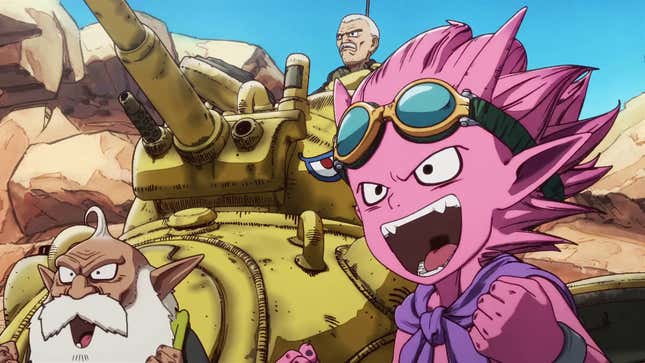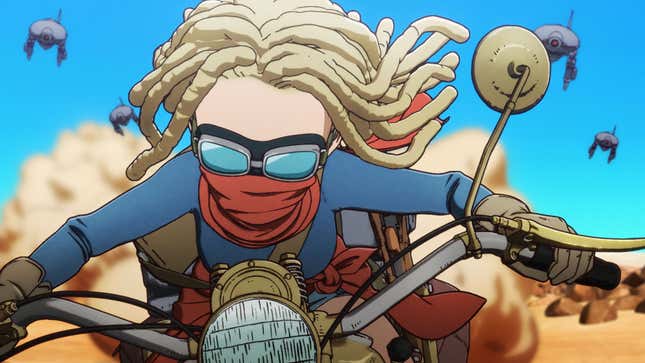
When news of Dragon Ball creator Akira Toriyama’s sudden passing hit social media, I found myself staring at a black-and-white photograph of the legendary artist. Toriyama’s iconic work has always been immediately recognizable, a charming calling card that defines everything from Chrono Trigger’s larger-than-life sprites to Dr Slump’s wonderfully expressive manga panels. Yet despite following Goku’s adventures with wide-eyed adoration as a kid, I realized I’d never actually seen a picture of the man who brought me such joy.
Growing up in the UK in the ‘90s, Dragon Ball Z was a world away from everything else on British television. From its quirky blend of humour and machismo, to its intoxicating depiction of interplanetary adventure and slickly choreographed fight scenes, it was a spectacle that enraptured myself and millions of other children. It’s one of those rare pop-culture phenomena that transcends the medium that birthed it. Ask millennials now, and even people who “don’t like anime” will smile wistfully at the mention of Frieza and Trunks. As happy memories of Krillin, Goku and Vegeta course through my head, the weight of the talent that we’ve lost begins to sink in.
Thankfully for us mourning manga fans, there’s one last morsel of Toriyama left to savor—Sand Land.
Enter Sand Land
Published in the same legendary weekly manga serialisation that birthed Dragon Ball, Shonen Jump, 2000’s short-lived Sand Land was one of Toriyama’s last original creations. Adapted into a 2023 feature film, that 2023 movie has now been split up into Sand Land: The Series for Disney + and Hulu, with additional unseen footage sprinkled into the mix to pad out the OVA into an anime. While the first seven episodes retell the story of the original 2000s manga, the upcoming second season tells an all-new follow-up tale, which looks to be the final story penned by the late Toriyama.
Part Mad Max, part Dragon Ball, this desert-set adventure offers a suitably Toriyama twist on the post apocalypse, telling a dystopian story about a mischievous demon prince and his oddball band of misfits with the kind of warmth and humour that made Dragon Ball so beloved.
Taking place in a mysterious future where humans and demons coexist, it will shock you to learn that mankind has utterly wrecked our once luscious planet, transforming a once resource-abundant home into a permanent desert. With water now scarce, what little remains is hoarded by the King and hocked for huge profit, plunging both the parched humans and demons into a desperate state of perennial war, robbing each other for what few drops of water remain.
As befits the man that defined the JRPG with his art for Chrono Trigger and Dragon Quest, Sand Land feels like a mismatched RPG party embarking on a grandiose adventure. Desperate and with little water for either the local human town or to quench the thirst of the demon’s secret lair, the martial arts-loving demon prince Beelzebub and grizzled human sheriff Rao reluctantly join forces to fend off the Royal Army and track down a rumoured hidden spring.

An RPG-worthy, map-roaming adventure
There’s a real good-time, road-trip feel to Sand Land, as these pair of natural enemies and their demon stooge, Thief, clumsily roam the vast and dangerous desert in search of water for the populace. There’s a surprising amount of political intrigue, too, with some cleverly executed plot twists and revelations lending a pleasing amount of emotional weight to what initially feels like a somewhat frivolous story. As our band of lovable misfits commandeer Royal Army tanks, beat up opportunistic bandits and narrowly avoid gargantuan sand dragons, Sand Land expertly blends lofty themes of environmental catastrophe and massive wealth inequality with jokes about hair spray, video games and, er, Santa Claus.
Much like the original Dragon Ball then, this is very much a jovial journey of misfits. The highlight in this particular cast of Toriyama oddballs? A troupe of outlaws called the swimmers. This gaggle of ruthless yet slightly clueless elderly bandits inexplicably wear nothing but swimwear—complete with forehead-hugging goggles—as they roam the entirely water-devoid, arid desert. There’s more than a hint of Master Roshi and The Ginyu Force to these lovably cringey speedo-wearing freaks, and their increasingly absurd attempts to thwart Beezlbub and Sheriff Tao are pulled off with the kind of eyebrow raising charm that only Toriyama could manage.
Thanks to the original manga’s brevity, Sand Land tells a refreshingly back-to-basics story, sidelining Dragon Ball Z’s obsession with power levels in favour of a rollicking good time. From thrilling tank-on-tank warfare, to an insectoid showdown that feels grin-inducingly reminiscent of the Z warriors’ battle against Nappa’s Saibamen, it’s a delight to watch playful action weave effortlessly between a thought-provoking tale of environmental catastrophe and unchecked capitalist greed.
From demonic characters that have more than a whiff of those iconic Dragon Quest monster designs, to a military that owes more than a few royalties to the Red Ribbon Army, this intriguing creation feels like a greatest hits tour de force of Toriyama’s work. It’s these delightful throwbacks to previous Toriyama creations that makes watching Sand Land feel so bittersweet.
The result is a heart-wrenching reminder of the talent that the world just lost. From its snappy pacing to expert blend of action, political intrigue and weird jokes, it’s a work that cements Toriyama as an artist that should be just as treasured in the pop-culture pantheon as Hiyao Miyazaki.
While countless creators have attempted to match the spirit of his seminal shonen, Sand Land serves as a reminder of the unique charm that courses through every frame of Toriyama’s tales. Whether you track down last year’s enjoyable 90-minute standalone film, or opt to dive into the extended series split across seven episodes, Sand Land is a desert-spanning delight. As I stare back at Toriyama’s smiling black and white face on my timeline, I take comfort in knowing that Toriyama’s modern output still feels just as magical as Dragon Ball did in the 1990s. Thank you for taking me back to my childhood once again, Mr Toriyama—see you on Snake’s Way.





